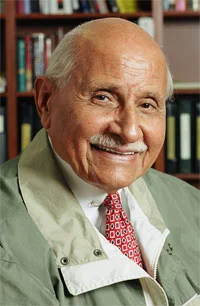 Percy Sutton died he was 89. Sutton was a civil-rights activist, entrepreneur and lawyer.[1]
Percy Sutton died he was 89. Sutton was a civil-rights activist, entrepreneur and lawyer.[1]| (November 24, 1920 — December 26, 2009) |
Percy milked cows and rode around San Antonio with his father in the same Studebaker that was used for funerals, distributing milk to the poor. He liked to attach strings to cans to pretend to be a radio broadcaster.
Sutton joined the Boy Scouts of America and attained the rank of Eagle Scout in 1936 and was recognized with the Distinguished Eagle Scout Award as an adult. Sutton stated that scouting was a key factor in shaping his life.[2]
At 12, he stowed away on a passenger train to Manhattan where he slept under a sign on 155th Street. Far from being angry, his family regarded it as an adventure.
His family was committed to civil rights, and he bristled at prejudice. At 13, while passing out N.A.A.C.P. leaflets in an all-white neighborhood, he was beaten by a policeman.
He took up stunt-flying on the barnstorming circuit, but gave it up after a friend crashed. Later, during World War II, he served with the Tuskegee Airmen, the famed all-black unit in the Army Air Forces, as an intelligence officer. He won combat stars in the Italian and Mediterranean theaters.
Sutton attended Prairie View A&M University in Prairie View, Texas; the Tuskegee Institute in Tuskegee, Alabama; and the Hampton Institute in Hampton, Virginia. He went on to attend Brooklyn Law School in Brooklyn, a borough of New York City, New York.
During the 1950s and 1960s, Sutton became one of America's best-known lawyers[citation needed]. He represented many controversial figures, such as Malcolm X. After the murder of Malcolm X, Sutton and his brother Oliver helped to cover the expenses of his widow, Betty Shabazz.[citation needed] Sutton's civil-rights advocacy took him even further in the minds of many. Being jailed with Stokely Carmichael and other activists endeared him to the Harlem community and showed many that he was willing to be placed in harm's way for his client's sake.
Sutton was a longtime leader in Harlem politics, and was a leader of the Harlem Clubhouse. The Clubhouse has dominated Democratic politics in Harlem since the 1960s. His allies in running the Clubhouse were former New York City Mayor David Dinkins, U.S. Representative Charles Rangel, and former New York Secretary of State Basil Paterson.
 He ran for borough president of the Manhattan borough of New York City in 1965, and won with 80% of the vote. He served in that post until 1977, when he ran for the Democratic nomination for New York City Mayor against U.S. Representative Ed Koch, New York Secretary of State Mario Cuomo, New York City Mayor Abraham Beame, former U.S. Representative Bella Abzug, and U.S. Representative Herman Badillo. Koch won the nomination and mayoralty.
He ran for borough president of the Manhattan borough of New York City in 1965, and won with 80% of the vote. He served in that post until 1977, when he ran for the Democratic nomination for New York City Mayor against U.S. Representative Ed Koch, New York Secretary of State Mario Cuomo, New York City Mayor Abraham Beame, former U.S. Representative Bella Abzug, and U.S. Representative Herman Badillo. Koch won the nomination and mayoralty.
In 1971, Sutton cofounded the Inner City Broadcasting Corporation which purchased New York City's WLIB-AM, which became the city's first African-American-owned radio station.
He initiated, December 2009 the revitalizing of the legendary Apollo Theater in Harlem. He also produced the successful It's Showtime at the Apollo, a syndicated, music television show, first broadcast in September 12, 1987.
To see more of who died in 2009 click here.












 In 1984, script writer
In 1984, script writer 

